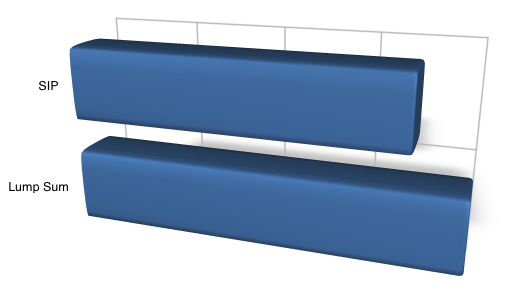In many of the previous posts, I have talked a lot about the advantages of SIP(Systematic Investment Plan) and how averaging the cost of an asset helps hedge against volatility. But if something is so good, there must be some disadvantages. SIP too has disadvantages and doesn’t give you good returns in some cases.
In a bullish market, investing lump sum yields you much higher returns than investing in SIP.

This is the only disadvantage when it comes to SIP. If you have a few lakhs or crores of rupees to invest in the market and you are currently in a bullish market, it makes sense to put all that money in one go. But there are a few problems here
- It is very difficult to time the market and catch the lows. The years 2003 to 2008 was a good bull run and people who put in a lump sum money in 2003 and took it out by 2008 would’ve become super rich. But how many did it? No one we have heard of.
- Even if you can time it, not everyone will have lakhs of rupees, ready to invest whenever the market is ready for the bull run. Most of the retail investors can spare a few tens of thousands maximum per month and it is easier to invest monthly.
- Even if you can time the market and also have crores of surplus money to invest, your mind wouldn’t allow you to stay invested in the market for the long haul. It is basic psychology when fear kicks in as soon as you see unthinkable returns on your invested money. Imagine you investing Rs. 1 lakh and within a year it doubling to Rs. 2 lakhs. Your first thought would be to get out of the market with the profits, before everyone begins to sell. It will cause you to miss an even bigger bull run.
- There is also another psychology that is the reverse of what you see in the above point. Most retail investors do not invest when the markets are at the lowest. Only after the markets have continuously made new highs, we begin to take notice and want to get in. This is totally opposite of what we should do. “Buy low, sell high”. Just like the current rally, it is the FII (Foreign Institutional Investors) who are putting in all the money and the retail investors and DII (Domestic Institutional Investors) who are selling.
Based on all these points – Yes! You can get better returns than SIP in some rare cases. But the risks associated with lump sum investing far outweighs the advantages in systematic investing.
Hello..
I have around 4 lacs and I am planning to have them locked in for 5 yrs or above and hence interested to park it in MF.
Please suggest what is a better fund to have purchased? Is HDFCBirla Equity fund good? or invest in debt funds?
Please advice.. Thanks..